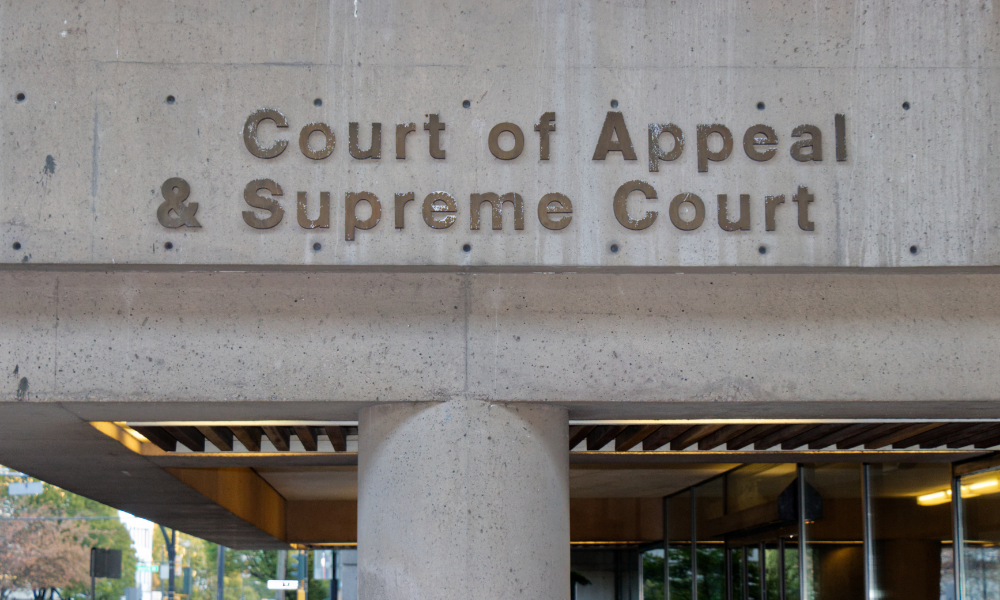
Issue involves her loss by being unable to work long hours required by legal career due to injury

The British Columbia Court of Appeal has set aside a trial court’s order upon finding that the judge failed to project a lawyer’s likely earnings while considering her injuries after two motor vehicle accidents and other relevant contingencies.
In Aujla v. Boldt, 2025 BCCA 228, the first accident occurred in June 2015 on Ladner Trunk Road in Surrey while the appellant was a front-seat passenger in her father’s car. She said she immediately experienced pain in her jaw, back, pelvis, and neck.
The appellant started law school at Thompson Rivers University in Kamloops in September 2015. In January 2016, the second accident occurred while she was a front-seat passenger in a vehicle her roommate was driving from a resort back to Kamloops.
The appellant alleged that the second accident worsened her symptoms from the first accident and led to sleep loss, more neck and back pain, swollen knees and knee pain due to her knees striking the dashboard, and more frequent migraines, which affected her ability to pay attention in her classes.
The appellant graduated from law school in May 2019 and began working as an associate solicitor at Wilson Rasmussen LLP in Surrey.
The appellant filed actions seeking damages for personal injuries arising from the two accidents, for which the respondents admitted liability. The trial issues included the nature and cause of the injuries and the quantum of damages for her losses due to the accidents.
The appellant said her work earnings came at the expense of her health and comfort, and trial witnesses added that she showed pain-related symptoms at home and work.
An orthopedic surgeon assessed the appellant in December 2019. The surgeon’s opinion was that her exercise program, consisting of spin cycling and jogging, probably caused her knee-related symptoms, with the possibility that she risked developing such symptoms due to weakened quadriceps after the two accidents.
In July 2022, a trial judge of the Supreme Court of British Columbia awarded $125,000 in non-pecuniary damages; nothing for past lost earning capacity; $240,000 for future lost earning capacity, based on income loss for one and a half years; $111,555 for future care costs; and $7,466.26 in special damages.
The judge saw a real and substantial possibility that the appellant’s symptoms would affect her ability to work longer hours. She said the appellant was driven, performed exceptionally well as a lawyer, and would likely keep achieving high earnings.
The appellant filed two appeals alleging that the judge made an inordinately low award and wrongly estimated her future loss of earning capacity. The Court of Appeal for British Columbia allowed the appeals and remitted the proceedings to the Supreme Court for a new trial.
The appeal court ruled that the judge erred in law by failing to disclose in her trial reasons whether she considered the alternate causation theory regarding the appellant’s knee injuries and failing to perform the required analysis under Athey v. Leonati, 1996 CanLII 183 (SCC), [1996] 3 SCR 458.
The appeal court noted that the judge apparently rejected the appellant’s impact with the dashboard as her primary theory of causation for her knee injuries.
However, the appeal court said the judge did not address the orthopedic surgeon’s evidence that the appellant’s post-accident exercise program probably caused her knee injuries and the potential causal connection between the accidents and the program.
The appeal court explained that this omission made it uncertain whether the judge considered a possible indirect but accident-related cause of the appellant’s knee injuries on either a “but for” or material contribution standard.
Next, the appeal court determined that the judge erred in principle in assessing damages for future lost earning capacity.
The appeal court held that the judge failed to weigh the available evidence on the appellant’s with- and without-accident earning capacity or analyze the income level she would have realistically achieved without the accidents, considering her intentions and the probabilities of attaining them.
The appeal court said it could neither meaningfully review the judge’s reasons nor substitute a principled assessment in line with the findings and evidence.
The appeal court noted that the judge apparently focused on the appellant’s steadily increasing income for her legal practice and opted for a multiple-of-income approach to calculate damages for future lost earning capacity.
The appeal court said the appellant’s successful legal career was, on its own, irrelevant to her future earning capacity because the crucial issue was her loss due to her inability to work the long hours needed for a career in law.
According to the appeal court, while the appellant’s income rose before trial and could keep rising after trial, it was possible that it had not increased and would not increase as much as it likely would have if not for the accidents.
The appeal court concluded that the judge’s orders called for a new trial on all issues, including the award for past lost earning capacity, given the broad claims requiring remittal to the trial court and the necessity of avoiding inconsistent findings.